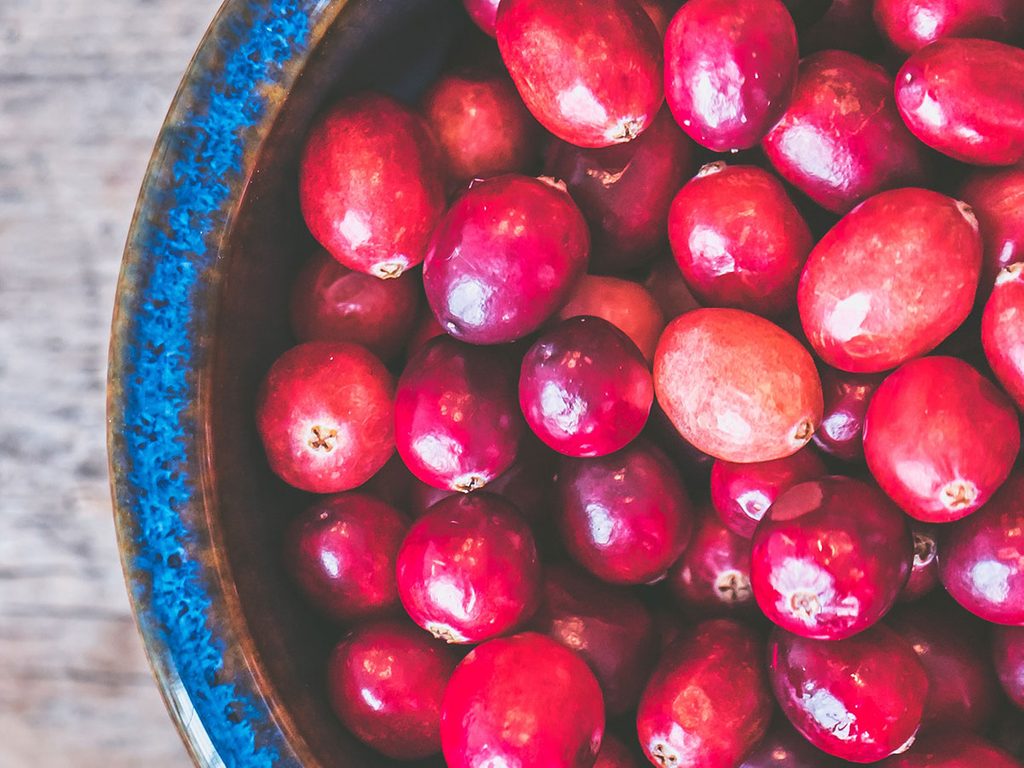The Health Benefits of Cranberries

Canada is the world’s second largest exporter of cranberries. Here’s why they’re so healthy
Did you know Canada is the world’s second-largest exporter of cranberries, after the U.S.? Cranberries are native to our Atlantic provinces, where they are known as “marsh apples” to some. But they grow in other parts of Canada, too. Of all our provinces, B.C. exports the most cranberries by far, followed by Quebec, Ontario and Nova Scotia.
The cranberry plant is an evergreen vine that likes wet soil, preferably sand and peat, which is why the fields are often called “cranberry bogs.” The berries are harvested in fall by flooding their growing areas with water.
We know you’re familiar with cranberries—you eat dry ones on your salad, you eat them as a sauce with your Thanksgiving dinner (or maybe even in a mulled cider)—but did you know they offer many health benefits? If you’re prone to urinary tract infections, you, especially, will want to want to keep reading.
They’re a Source of Antioxidants
Some of the antioxidants in cranberries come from proanthocyanidins, which give the berries their vivid colour. These antioxidants neutralize free radicals, which help cut the risk of developing chronic diseases such as cancer, heart disease and diabetes. Try them in this gluten-free cranberry pecan stuffing for your Thanksgiving feast.
They Can Lead to Better Bladder Health
Studies have shown that drinking cranberry juice regularly can decrease the number of urinary tract infections (UTIs), sometimes called cystitis, in women who are prone to them. (Think you might have one? Here are the silent symptoms of a UTI.) It inhibits the ability of the E.coli bacteria to adhere to bladder walls. Interestingly, a study published by Harvard Medical School showed that eating a 1.5-ounce (45-g) serving of sweetened dried cranberries might also be able to inhibit bacterial adherence and potentially help prevent UTIs.
Cranberry juice has long been used as a home remedy to also prevent kidney stones and bladder stones. This benefit was originally attributed to quinic acid, a cranberry substance that increases urine acidity and prevents the formation of calcium stones. Researchers once thought this acidity helps prevent cystitis. Studies show, however, that cranberries also contain a natural antibiotic substance that makes the bladder walls inhospitable to the organisms responsible for UTIs. This prevents the bacteria from forming colonies; instead, they are washed out of the body in the urine.
Buy the Right Stuff
Many cranberry drinks are so diluted with other juices that you won’t get the full benefit of the pure juice (like our Apple Cranberry Sangria, sadly). Read labels carefully, or consider making your own at home with a juicer. Warning: Pure juice is so tart you may want to add a little bit of sweetener or cut it with some apple juice.
This article was originally in the October 2014 issue of Best Health magazine.
Next, learn about our favourite dish featuring cranberry sauce: The Ultimate Leftover Turkey Sandwich.




